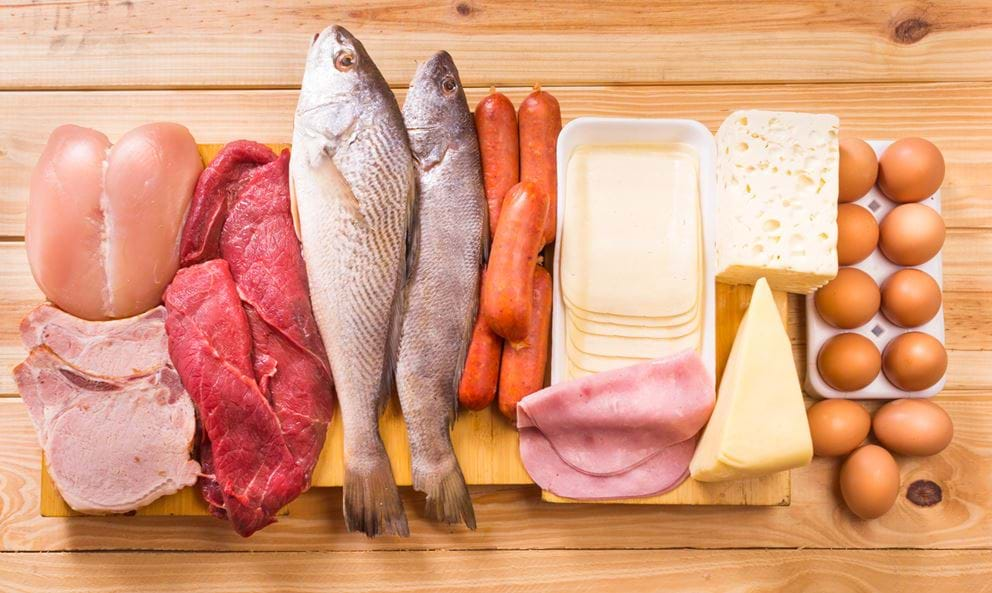Which Meat is Best for a Protein Boost?

As everyone knows, protein is essential for building muscle and repairing the body’s tissues after any kind of intense workout.
Veteran lifters generally have a set of well-tried strategies for getting enough protein in their diets each day, but for the novice who finds they’re relying a little too much on whey shakes, it’s always good to find some culinary inspiration.
Luckily, for every brand of protein powder on the market, you can find a tasty and sometimes obscure meat to add to the menu. Believe it or not, there’s more out there than just skinned, boiled chicken breast.
Without further ado, here’s a list of some of the best cuts of meat for upping your protein intake the tasty way.
(All nutritional information in this article is taken from the USDA food composition database1. All the values are for raw meat unless otherwise stated.)
Beef jerky (processed) — 33.20g of protein per 100g
Beef liver — 26g of protein per 100g
Beef steak (grass fed) — 20.85g of protein per 100g
Beef tenderloin roast (lean, trimmed to 0 inches fat) — 21.94g of protein per 100g
Buffalo steak (top round) — 21.44g of protein per 100g
Chicken breast (skinless) — 22.50g of protein per 100g
Chicken drumstick (boneless) — 19.19g of protein per 100g
Chicken liver — 16.92g of protein per 100g
Cod (wild caught) — 17.81g of protein per 100g
Duck breast (wild caught, boneless) — 19.85g of protein per 100g
Frog legs — 16.40g of protein per 100g
Goat — 20.60g of protein per 100g
Goose breast (skinless) — 24.31g of protein per 100g
Lambchop (leg, lean) — 21.10g of protein per 100g
Lamb shank (trimmed to 1/4-inch fat) — 18.58g of protein per 100g
Mackerel (wild caught) — 18.60g of protein per 100g
Ostrich tenderloin — 22.07g of protein per 100g
Pheasant breast (boneless) — 24.37g of protein per 100g
Pheasant leg (boneless) — 22.20g of protein per 100g
Pork bacon (cured, unprepared) — 12.62g of protein per 100g
Pork knuckle (cured) — 25.66g of protein per 100g
Pork leg (cap) steak — 21.64g of protein per 100g
Pork liver — 21.39g of protein per 100g
Rabbit (domesticated) — 20.05g of protein per 100g
Rainbow trout (wild caught) — 20.48g of protein per 100g
Salmon fillet (wild caught) — 21.24g of protein per 100g
Sardines (skinless, boneless) — 21.82g of protein per 100g
Tuna steak (wild caught) — 25g of protein per 100g
Turkey breast (skinless) — 21.89g of protein per 100g
Turkey drumstick (boneless) — 20.52g of protein per 100g
Turkey neck (boneless) — 16.51g of protein per 100g
Veal loin — 20.07g of protein per 100g
Venison (deer) — 21.50g of protein per 100g
…And the Vegetarian Alternatives?
Of course, there are far more than just meat-based protein sources. Whether you’re a dedicated vegan, vegetarian or are simply try to cut down on your meat intake; these vegetarian alternatives are a great shout.
Almonds – 21.15g of protein per 100g
Black beans (cooked, boiled) – 8.86g of protein per 100g
Buckwheat – 13.25g of protein per 100g
Chia Seeds – 16.54g of protein per 100g
Chickpeas – 20.47g of protein per 100g
Edamame – 11.2g of protein per 100g
Lentils (raw) – 24.63g of protein per 100g
Peanut butter (reduced fat) – 25.90g of protein per 100g
Pumpkin seeds – 30.23g of protein per 100g
Tofu (firm) – 9.04g of protein per 100g
1 https://ndb.nal.usda.gov/ndb/search/list?qlookup=05064


